Please
Note: Firefox and some other search engines are not suitable
– Use “Internet Explorer” for this page to load
perfectly!

Click
the logo above to reach the ssMaritime FrontPage for News Updates
& “Ship of the Month”
With
Reuben Goossens
Maritime
Historian, Cruise‘n’Ship Reviewer & Author
“Compania
Argentina De Navegacion Dodero S.A.”
Dodero
Line - Transferred to “ELMA”
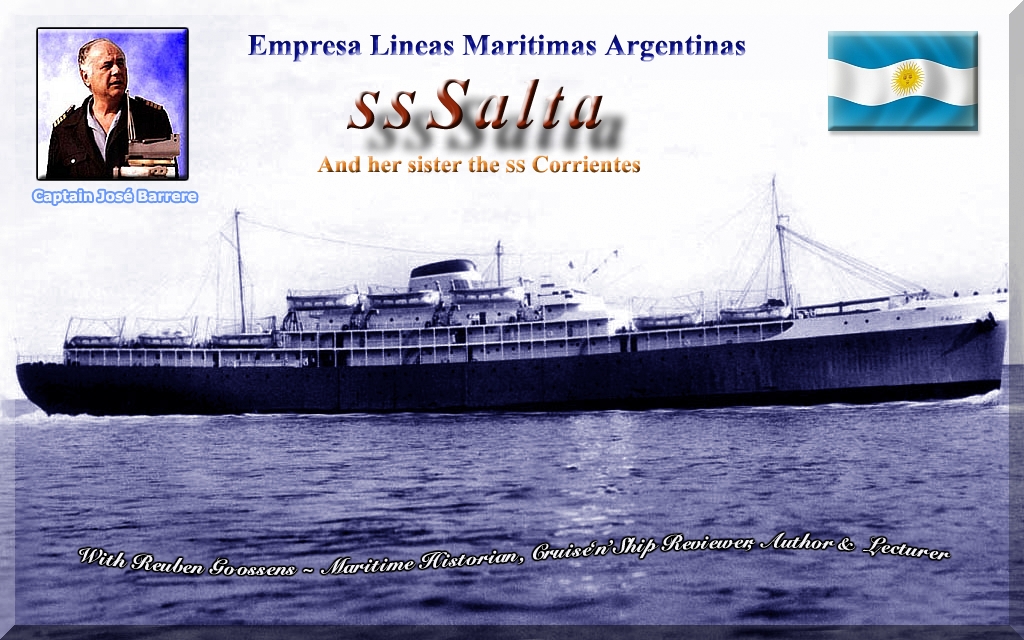
Introduction
to the Dodero Line:
The original Company was named; “Compania
Argentina De Navegacion Dodero S.A.,” or as they were known
- the “Dodero Line.” This company
operated a considerable fleet of passenger liners, and they had 8
ships operating on the very busy Buenos Aires to London service.
Then there were 3 passenger liners operating on the Buenos Aires to
Amsterdam and Hamburg service, thus a total of 11 ships in all.
However after the war that would be 13 ships as two more would
join the extensive fleet!
From
a simple Freighter, an Escort Aircraft Carrier to a Passenger
Liner:
There would be two new ships on the horizon for
the company, but they already had a history prior to their
arrival and this is their story.
The first ship was originally to have been
simple C-3-S-A1 Class freighter and she was originally to have
been named SS Mormacmail for the famed American “Moore
McCormack Lines,” but long before she could be completed she
was required for the US war effort and then the British Navy and
she was rebuilt and completed as Escort Aircraft Carrier by
Williamette Iron & Steel at Portland, Oregon. Thus the now ex
freighter being quite a different ship was launched on March 7,
1942 and named HMS Tracker, with her Battle Number being BAVG-6
just whilst she was under US jurisdiction, and then D-24 with the
British Royal Navy.
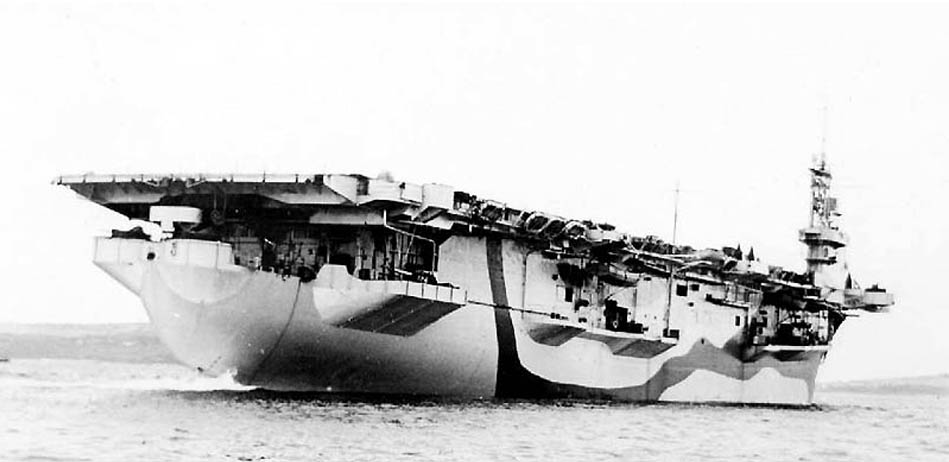
The
Royal Navy HMS Tracker D-24
The second ship was also a C-3-S-A1 Class ship,
originally named USS Jamaica and she was going to be used by the
US Navy, but again she was also seconded to the Royal Navy become
a “Prince William” Class Escort Aircraft Carrier and
she was launched on April 21, 1943 and was named HMS Shah, with
her Battle Number being D-21.
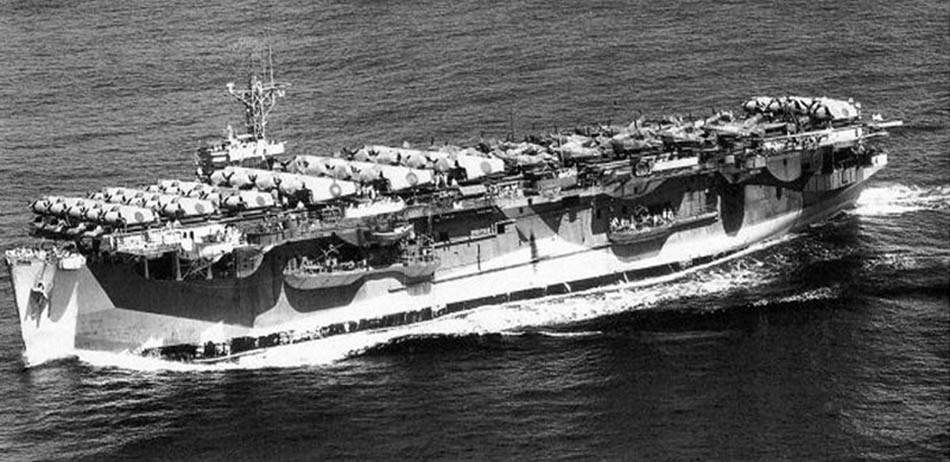
And
here we have a superb aerial view of the HMS Shah D-21
Both ships had admirable war records that can
be located online and LINKS are available at the bottom of this
feature! After the war these brave ships were laid up and placed
on the open market and they were purchased on June 20, 1947
Both the ex HMS Tracker and Shah were sold to
“Rio De La Plata, S.A.” on June 20, 1947 to be rebuilt
into passenger ships. The work was to be carried out by Newport
News S.B. & D.D. Co., at Newport News in Virginia, there were
they were comprehensively rebuilt into passenger ships having a
rather huge passenger capacity of 1,320 passengers in an all
Third Class configuration. However, for some reason the
rebuilding of these ships took much longer than had been
expected.

An
illustration of what the two ships would look like, thus a
massive transformation!
Finally upon their completion, both were sold
to the Argentinean, “Compania Argentina De Navegacion Dodero
S.A.” to operate them as immigrant ships and both were
transferred to the Argentine Flag and Registry given the name of
SS Corrientes and Salta.
“Dodero Lines” would place them on
their Genoa and Naples service, sailing via Marseilles, Barcelona,
Lisbon, Las Palmas, Rio de Janeiro and Montevideo to Buenos Aires.
Just for interest: At a later time these ships
must have had a refit for they had 4 passengers in First Class
and 18 additional passengers, a total of 1,338 in Third Class.
Thus these rather small, 12,000-ton ships had a huge
1,342-passenger payload and that was simply ridiculous to say the
least! These ships were obviously were obviously intended to
transport emigrants and I would assume that their public
facilities would have been quite modest to say the least.
Two
New Liners - SS Corrientes and Salta:
The completed SS Corrientes and SS Salta
entered the Genoa to Buenos Aires service early in 1951, and they
were without a doubt solid ships, and certainly not unpleasant
looking ships externally, for the result of a conversion at the
Newport shipyards, although purely practical, amazingly they had
a reasonably pleasant profile and certainly very much better than
many other C-3 class conversions, which were externally far more
basic and boxlike!
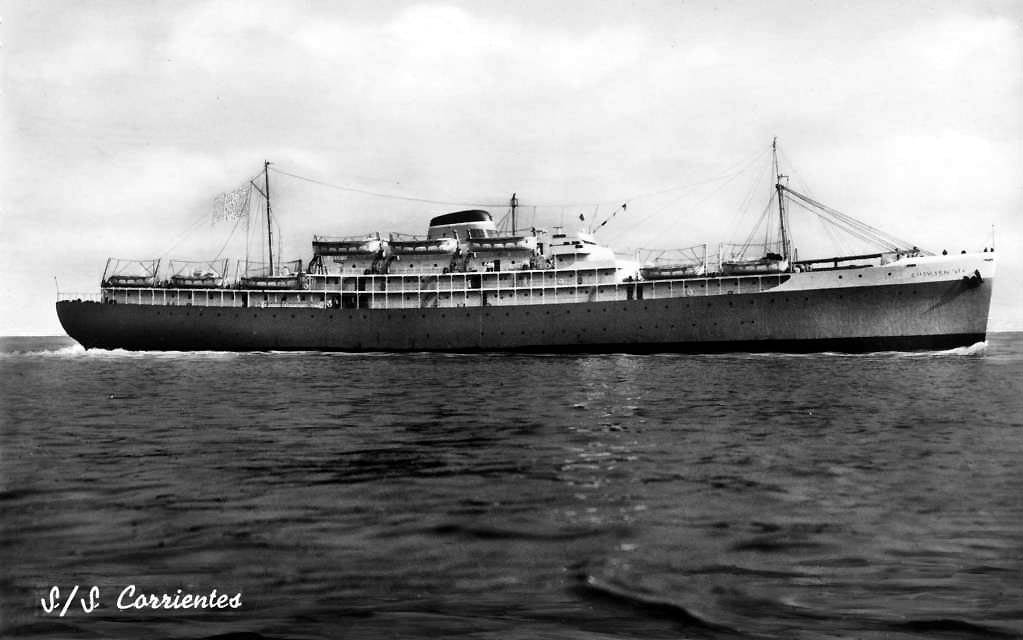
An
official postcard of the SS Corrientes a pleasant looking ship,
see another C-3 conversion below …
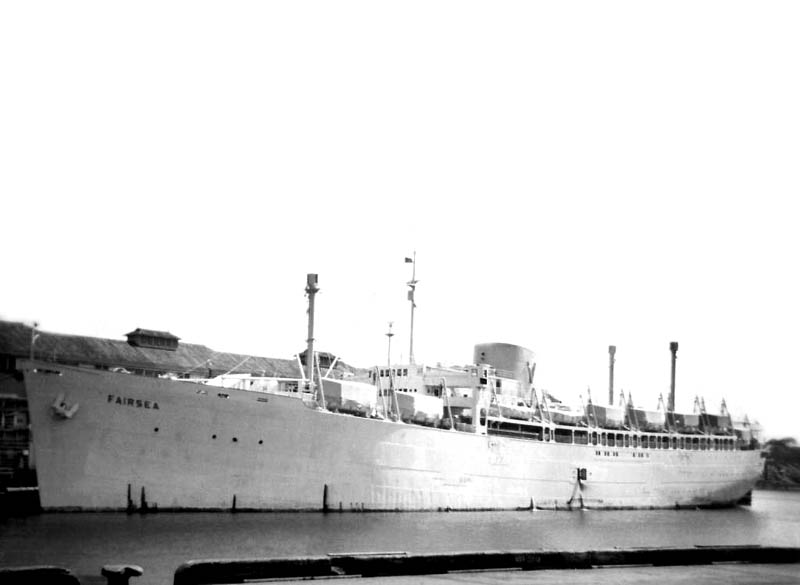
The
Sitmar liner SS Fairsea, seen as Woolloomooloo Wharf Sydney,
Australia on December 31, 1949
She
did receive additional improvements to het exteriors, but never
became a beautiful white swan!
Both ships had two Steam Turbine Engines having
been manufactured by Allis Chalmers, which were good and reliable
units! The Salta was given the call sign LPCS, whilst I was
unable to locate that of the Corrientes.
After the fall of the Peron Government in 1955,
sadly the Dodero Line ceased operations and the management of all
their ships fell under the control of the Government, but soon it
passed to “Flota Argentina de Navegación de Ultramar”
also known as “FANU.” But, in 1962, “FANU”
merged with the state-owned “Flota Mercante del Estado”
to form a new company named “Empresa Lineas Maritimas
Argentinas” or “ELMA.”
Regardless of the legal and economic
circumstances at the time, the SS Corrientes and Salta continued
sailing on their regular services throughout the 1950s and 60s
connecting Europe to South America and vice versa offering low
fares on the tourist run from Argentina to Europe.
The
TSMS Lakonia Tragedy December 1964:
The SS Salta became well known as she was
involved with an incident with a famous classic passenger ship
that was built in Amsterdam, the Netherlands in 1929 as the
luxury liner, the MS Johan van Oldenbarnevelt, lovingly known
around the world as the JVO. She was sold to the Greek Line and
was handed over to them in Genoa in March 1963, and she soon
became the ill-fated cruise ship MS Lakonia by the end of that
year.
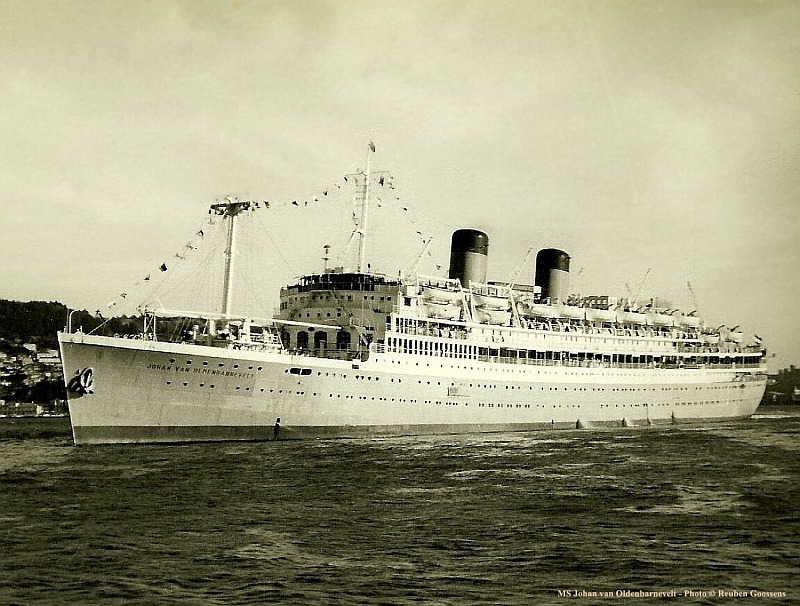
The
greatly beloved JVO departs Wellington New Zealand for the final
time on January 30, 1963
She
had donated her ships bell to one of the local High Cchools!
Photograph
© by the Author, Reuben Goossens
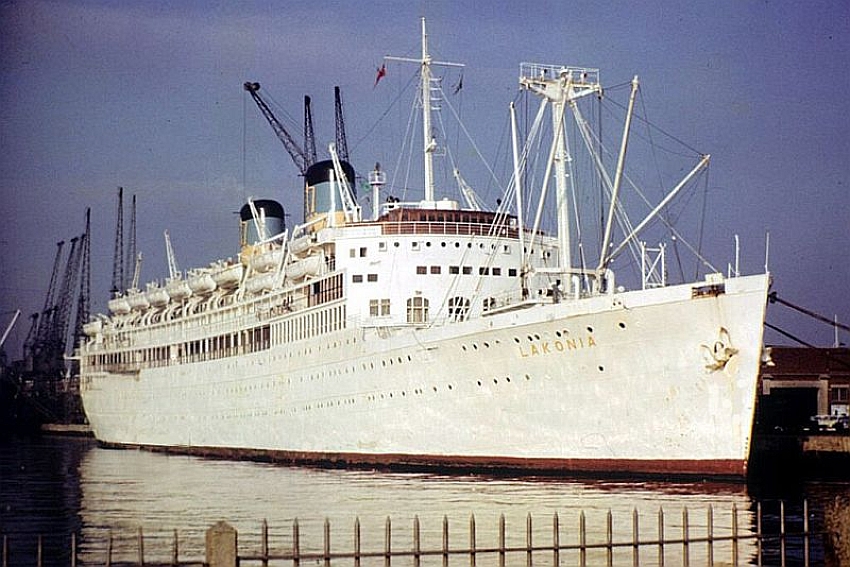
Here
we see the Lakonia looking good and preparing for, as the Greek
Line advertisements and handbooks
stated
… “Here is a Holiday you will remember and talk
about for the rest of your life”
This
Christmas cruise certainly would be remembered, but for all the
wrong reasons!
Whilst she was on an eleven-day Christmas
cruise to Madeira, Tenerife and Las Palmas, etc, in December
1963, however, as she was just 180 miles North of Madeira and 550
miles northwest of Casablanca-Morocco on the evening of the 22nd.a
small fire broke out in the barber shop, however it rapidly
caught hold and it spread throughout of the ship, which had to be
evacuated, it was a disaster. The Greek crew proved to be mostly
useless and could little to nothing with the original small fire,
besides being far too slow to act! In addition, far too many
proved to be utter cowards as they preferred to save themselves
rather than passengers, although there were some who were heroic!
Signals were sent out for help and the SS Salta received the call
and she sailed at full speed toward the Lakonia.
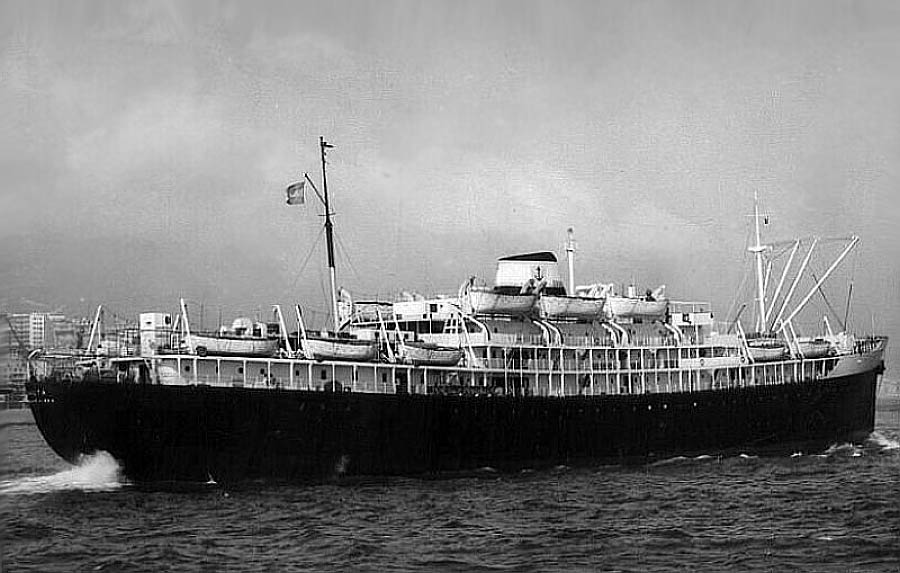
The
SS Salta seen around 1963-64
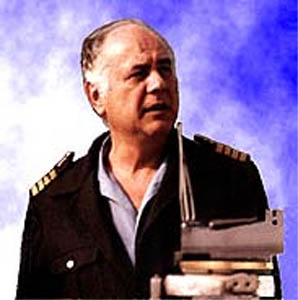 Early the next morning, Monday December
23, at just after 3:00 a.m., being just four hours after the
first distress call for the Greek ship, the Argentinean liner, SS
Salta arrived on the scene and commenced the rescue. The Salta
was under the command of Captain José Barrere and he had been on
his way from Genoa to Buenos Aires, but he acted calmly and
ordered his crew to commence lowering the lifeboats in order that
as soon it was safe and possible they could go and commence
searching for survivors. At 4.00 a.m. the British ship Montcalm
arrived on the scene, but the Salta had already rescued the first
survivors by 4.15 a.m., being a great effort and her crew did a
mighty job and throughout that day she continued and rescued many
of Lakonia’s passengers. Of course the other ships all did
an amazing job searching the waters for survivors and saving
other passengers as well as collecting those who had sadly died
away and were in the water. Some 95 passengers and 33 crewmembers
sadly passed away, although, there were 53 who were killed in the
actual fire, whilst the rest died from drowning, exposure or
injuries that were sustained due to diving overboard. The rescue
attempt continued all the next day on the 23rd.but the ship kept
on listing.
Early the next morning, Monday December
23, at just after 3:00 a.m., being just four hours after the
first distress call for the Greek ship, the Argentinean liner, SS
Salta arrived on the scene and commenced the rescue. The Salta
was under the command of Captain José Barrere and he had been on
his way from Genoa to Buenos Aires, but he acted calmly and
ordered his crew to commence lowering the lifeboats in order that
as soon it was safe and possible they could go and commence
searching for survivors. At 4.00 a.m. the British ship Montcalm
arrived on the scene, but the Salta had already rescued the first
survivors by 4.15 a.m., being a great effort and her crew did a
mighty job and throughout that day she continued and rescued many
of Lakonia’s passengers. Of course the other ships all did
an amazing job searching the waters for survivors and saving
other passengers as well as collecting those who had sadly died
away and were in the water. Some 95 passengers and 33 crewmembers
sadly passed away, although, there were 53 who were killed in the
actual fire, whilst the rest died from drowning, exposure or
injuries that were sustained due to diving overboard. The rescue
attempt continued all the next day on the 23rd.but the ship kept
on listing.
SS
Salta excellent master, Captain José Barrere--
But by Tuesday the 24th, Christmas Day she was
listing some 10 degrees whilst continuing to burn deep within.
The elegant spotless white liner that had departed Southampton
just five days ago was now a sad sight. Topside her bridge and
several of her aft decks caved in. Her white hull plates were
severely scared and were now black because of the fire.
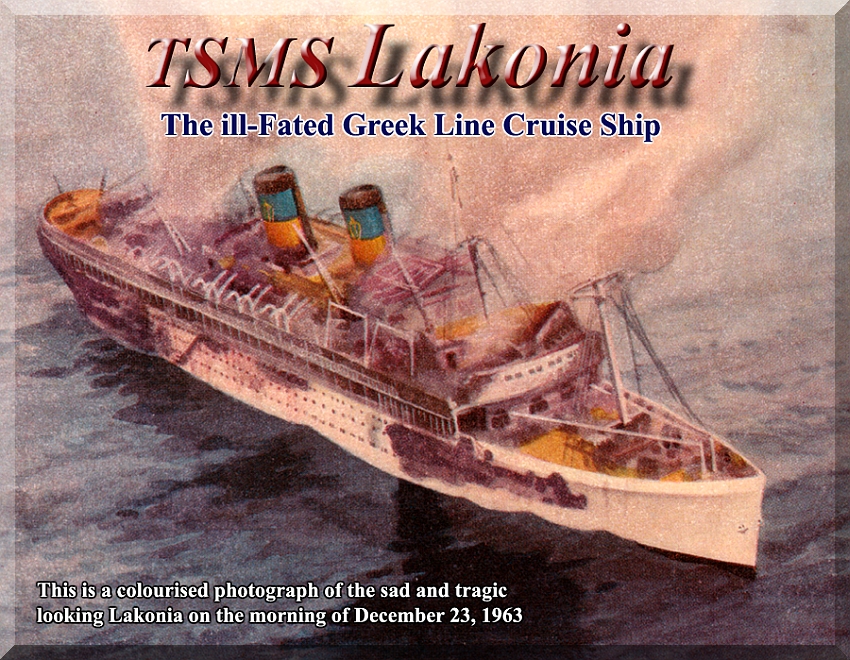
Finally on the 24th.Dutch
and Norwegian tugs with naval assistance, managed to attach
towropes to the stricken ship and commenced to tow the crippled
Lakonia towards Gibraltar. However, without much warning, five
days later, the dying ship, she finally gave up, mostly due the
worsening weather and she had commenced to take on water. First,
her list increased, then around noon on Sunday 29 December 1963;
the Lakonia began to sink fast.
There was no doubt,
but her end was certainly very fast; it was within three minutes
that she heeled over onto her starboard side and with a massive
splash she disappeared under the waves. It was a tragic end to a
ship that had been such a great and much loved liner, for the MS
Johan van Oldenbarnevelt was loved worldwide from Northern
Europe, Britain, the USA, Africa, to Australia and New Zealand.
Sadly when she was sold to the Greek Line she was sadly poorly
looked after and her crew were not trained up to standards and
her lifeboats had not been serviced at all since she had been
received back in March, thus through sheer negligence a once
great ship was now lost! Her story is available in full via a
link at the bottom of the page!
The
SS Corrientes and Salta’s final Days:
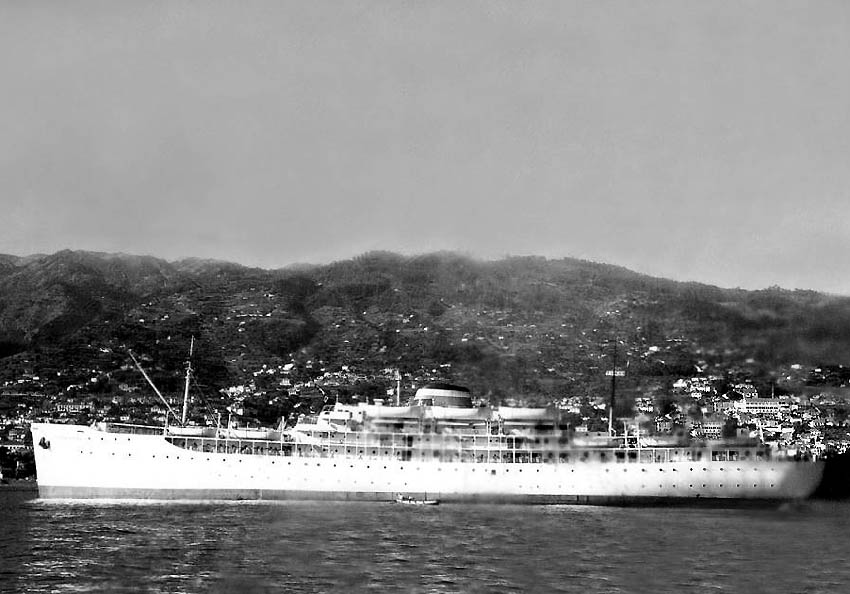
The
SS Corrientes is seen at what looks like Funchal
But sadly Salta’s
days were close to over for she only had twelve months left at
sea!
Sadly due to the maintenance of the SS
Corrientes, she was completely disabled due to a severe engine
failure in August 1964 and she had to disembark all her
passengers in Lisbon. A month later she was towed to the port of Antwerp,
Belgium where she was broken up for scrap metal.
Sadly, the Salta only lasted just several more
months, for in December of that year her sailing year concluded
due to severe breakdowns and boiler problems. She was laid up in Buenos
Aires and she remained idle for two years. She was the sold in
June 1966 to local Argentinean ship breakers and soon enough she
was broken up right there in Buenos Aires.
Specifications
SS Corrientes & SS Salta:
Owner:
Compania Argentina De Navegacion Dodero S.A.
Other
names:
SS Corrientes: HMS Tracker.
.
SS Salta: USS Jamaica, HMS Shah.
Builder:
Seattle Tacoma, 1942 & 1943.
Rebuilt:
1949-1951 Newport News S.B. & D.D. Co. at Newport News in Virginia.
Tonnage:
12,053 GRT (Gross Registered Tons).
Length:
492ft – 142.7m.
Breadth:
70ft – 21.2m.
Power:
Steam Turbine Engines by Allis Chalmers.
Screws:
One.
Speed.
16.5 knots service speed – 17.5 knots max.
Passengers:
1,320 Third Class as built.
.
4 First Class & 1,338 Third Class at a later date.
View
the War Records for the HMS Tracker and the HMS Shah
Also
read about the TSMS Lakonia tragedy, the ship built as the …
Luxury
Dutch Liner - MS Johan van Oldenbarnevelt
Use
the Back button on your browser or Close the Page to return to
the previous page
or go to our INDEX
Who is the Author of ssMaritime?
Commenced
in the Passenger Shipping Industry in May 1960
ssMaritime.com &
ssMaritime.net
Where
the ships of the past make history & the 1914 built MV Doulos
Story
Also visit my …
“Save The
Classic Liners Campaign”
Photographs on ssmaritime and associate
pages are by the author or from the author’s private
collection. In addition there are some images that have been
provided by Shipping Companies and private photographers or
collectors. Credit is given to all contributors. However, there
are some photographs provided to me without details regarding the
photographer/owner concerned. I hereby invite if owners of these
images would be so kind to make them-selves known to me (my email
address may be found on www.ssmaritime.com only), in order that due credit may be
given.
This notice covers all pages, although,
and I have done my best to ensure that all photographs are duly
credited and that this notice is displaced on each page, that is,
when a page is updated!
ssMaritime is owned and © Copyright by
Reuben Goossens - All Rights Reserved


![]()









